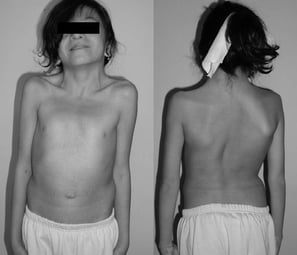Noonan Syndrome: Causes, Symptoms, Diagnosis and Treatment
Noonan syndrome is a genetic disorder that affects various parts of the body, leading to distinctive facial features, heart defects, and developmental delays. Often mistaken for other syndromes like Turner syndrome, it occurs in both males and females and can be inherited or arise from a spontaneous mutation.
GENETIC
Rishwin A R
2/17/20252 min read


Causes
Noonan syndrome is primarily caused by mutations in genes that are part of the RAS/MAPK signaling pathway, which is crucial for cell growth and development. The most commonly affected genes include:
PTPN11 (50% of cases)
SOS1 (10–15%)
RAF1 (5–10%)
KRAS (rare but severe cases)
The disorder follows an autosomal dominant inheritance pattern, meaning that a child only needs one mutated gene from a parent to develop the condition. However, new mutations can also occur without any family history.
Symptoms
The symptoms of Noonan syndrome can vary widely from person to person. Some of the most common features include:
Physical Features
Distinctive facial characteristics such as widely spaced eyes, a broad forehead, low-set ears, and a small jaw
Short stature due to delayed bone growth
Webbed neck or extra skin folds
Cardiovascular Issues
Pulmonary valve stenosis (narrowing of the pulmonary valve)
Hypertrophic cardiomyopathy (thickening of the heart muscle)
Other congenital heart defects
Developmental and Learning Challenges
Mild to moderate intellectual disabilities
Delayed speech and motor skill development
Social and behavioral difficulties
Other Concerns
Bleeding disorders (e.g., excessive bruising, prolonged bleeding)
Lymphedema (swelling due to fluid buildup)
Eye and vision problems (strabismus, refractive errors)
Skeletal abnormalities (pectus excavatum or pigeon chest)
Diagnosis
Noonan syndrome can be diagnosed through a combination of clinical evaluation and genetic testing.
Clinical Examination
Doctors assess the characteristic facial features, heart conditions, and other physical signs to determine if Noonan syndrome is likely.
Genetic Testing
Molecular genetic testing can confirm mutations in the known genes associated with Noonan syndrome.
A positive test helps guide treatment and assess the risk for family members.
Echocardiogram & ECG
Since heart defects are a hallmark of Noonan syndrome, a cardiac evaluation is essential for diagnosis and management.
Other Tests
Blood clotting tests to check for bleeding disorders
Growth hormone assessments if short stature is a major concern
Hearing and vision tests to address sensory impairments
Treatment
While there is no cure for Noonan syndrome, treatments focus on managing the symptoms and improving quality of life.
Cardiac Care
Medications or surgical interventions for heart defects
Regular monitoring by a cardiologist
Growth and Development Support
Growth hormone therapy may help improve height in children with significant short stature
Physical and speech therapy for motor and communication delays
Special education support for learning difficulties
Managing Other Health Issues
Blood clotting treatments for bleeding disorders
Orthopedic interventions for skeletal abnormalities
Regular eye and hearing checkups
FAQs
1. Is Noonan syndrome life-threatening?
Noonan syndrome is not typically life-threatening, but severe heart defects and other complications can pose risks. Regular medical care is crucial.
2. Can Noonan syndrome be inherited?
Yes, it can be inherited in an autosomal dominant manner, meaning a child has a 50% chance of inheriting the condition if one parent has the mutation.
3. What is the life expectancy of someone with Noonan syndrome?
Life expectancy varies based on the severity of symptoms, particularly heart defects. With proper medical care, most individuals live a normal lifespan.
4. Does Noonan syndrome affect intelligence?
Intellectual abilities vary, but many individuals have mild to moderate learning difficulties rather than severe intellectual disability.
5. Can Noonan syndrome be detected during pregnancy?
Yes, prenatal testing such as genetic screening and ultrasound may detect features associated with Noonan syndrome, but confirmation requires genetic testing.
"Noonan syndrome" by The Armed Forces Institute of Pathology (AFIP), public domain, via Wikimedia Commons. Link to image.
Syndromes.xyz
Explore medical syndromes and their details here.
For Educational purposes only
The information on this site is not in any way, replacement for professional advice. Always consult your physician regarding personal queries
Connect
Support
syndromesxyz@gmail.com
© 2024. All rights reserved.
